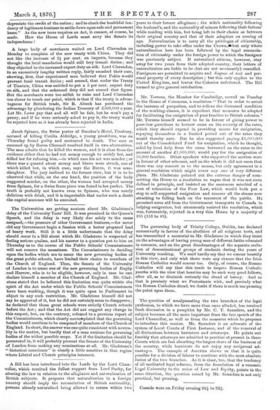Mr. Torrens, the Member for Cambridge, moved on Tuesday in
the House of Commons, a resolution "That in order to arrest the increase of pauperism, and to relieve the distressed condition of the working-classes, it is expedient that measures be adopted for facilitating the emigration of poor families to British colonies." Mr. Torrens himself seemed to be in favour of giving power to poor-law guardians to borrow sums on the security of the rates, which they should expend in providing means for emigration, repaying themselves in a limited period out of the rates they would thereby save. But he also suggested paying £1,000,000 out of the Consolidated Fund for emigration, which he thought, aided by local help from the sums borrowed on the rates to the amount of another .C1,000,000, would pay for the emigration of 50,000 families. Other speakers who supported the motion were in favour of other schemes, and on the whole it did not seem that there was any concert as to the means, but only agreement in a general resolution which might cover any one of very different plans. Mr. Gladstone pointed out the extreme danger of com- mitting the House to a resolution so vague that it was not even defined in principle, and insisted on the enormous mischief of a sort of relaxation of the Poor Law, which would both put a stop to self-supported emigration and remove all the shame now attaching to falling back on the resources of the public. He promised some aid from the Government transports to Canada in helping emigration, but strenuously resisted the resolution, which was, fortunately, rejected in a very thin House by a majority of 105 (153 to 48).


































 Previous page
Previous page